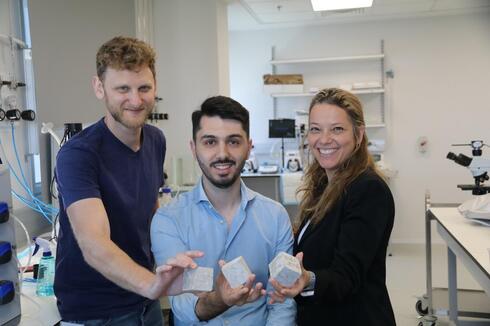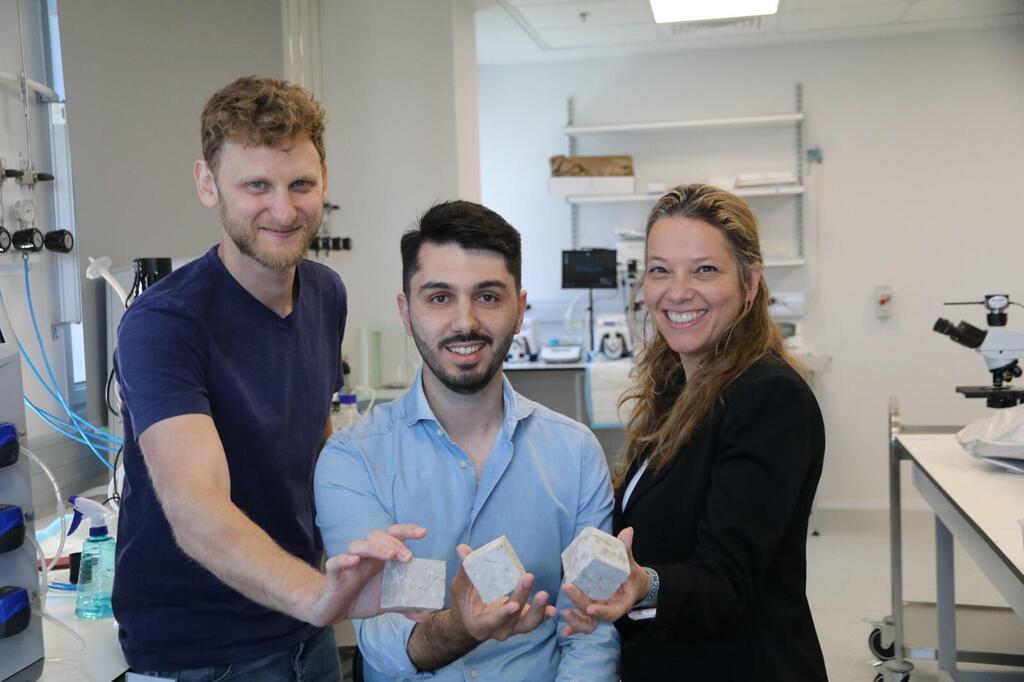
Boarding Pass
Starstone’s rock-solid plan to change the trillion-dollar concrete industry
The company has raised a total of $525,000 for its biology-based cement
“The cement and concrete industry is the second most pollutive industry in the world,” explained Gabriel Peer. “It is also one of the hardest to decarbonize. So there is a huge need for technologies that will lower emissions but still possess a scalable and cost-efficient approach.”
Starstone was founded in 2023 to help produce biology-based cement. Its solution won’t need quarries or kilns, thereby reducing the production value chain from three facilities to one. It claims that the solution, which will be available by 2027, will be closer to the customer by producing everything in the concrete-making facility.
For Peer, who comes from a background in construction and cultivated meat, the penetration into a trillion-dollar industry seems obvious. “Leading manufacturers of cement and/or concrete are understanding the rising demand for sustainable products as well as foreseeing the upcoming regulatory pressure thus looking for innovative technologies to reduce emissions,” he added.
You can learn more about the company below.
Company Name: Starstone
Sector: Construction Tech
Product/Service description:
Starstone is making Biology-based cement.
Founder Bios:
Gabriel Peer: Business executive with experience in leading some of the largest construction projects in Israel on the financial side as part of the IDF role as well as leading role in the cultivated meat industry.
Reut Sorek Abramovich: Experienced entrepreneur with a PhD in Microbiology and years of research focus on bio-structures.
Year of Founding: 2023
Last Investment Round: $525,000
Last Investment Stage: Pre-seed
Date of Last Investment: March 2024
Total investment to date: $525,000
Investors: IndieBio, SOSV
Current number of employees: 3
Open positions: 1
How was the idea born?
I have vast experience with construction that gave me a first seat view for the challenges and inefficiencies that comes with this industry. On top of that, in my previous role I led the business side of a leading cultivated meat start up so I witnesses the huge potential for biological processes to replicate traditional products. Reut and Raanan both have years of experience with developing real life solutions within BioTech and SpaceTech as well as relevant experience with micro organisms that form sturctures so they bring the necessary scientific knowledge that serves as the baseline for our value proposition.
What is the need for the product?
Due to the expected increase in population we need to build the equivalent of a New York City every month for the next 30 years to meet demand, all while lowering our impact on the planet. Already today, the cement and concrete industry is the second most pollutive industry in the world, and one of the hardest to decarbonize. So there is a huge need for technologies that will lower emissions but still possess a scalable and cost-efficient approach.
Leading manufacturers of cement and/or concrete are understanding the rising demand for sustainable products as well as foreseeing the upcoming regulatory pressure thus looking for innovative technologies to reduce emissions.
How is it changing the market?
It is completely changing the way cement is made, we replace traditional cement with cement alternative made from biology and other industrial byproducts.
Based on our solution, we won’t need quarries, nor kilns, we reduce the production process by more than 50% resulting in a solution will also be closer to the customer bu producing everything in the concrete making facillity.
How big is the market for the product and who are its main customers?
The total cement and concrete category is about $500 billion in market value. The opporutnity is massive.
In terms of initial customers they will be precast concrete manufacturers.
Currently there are about 4.2 billion tonnes of cement produced per year, assuming some technologies for decarbonization will achieve commercial viability, the market is big enough and the scale up timing will enable several companies to lead decarbonization efforts.
Does the product exist already? If not - at what stage is it and when is it expected to hit the market?
We are currently working on an non loadbearing precast concrete MVP, estimating to be commercially ready by 2026/2027.
Currently there are 3-4 companies working on using biology to develop cement alternative but each one has their own approach. Non of the companies are at commercial scale yet and they still require time to prove unit economics at scale.
Who are the main competitors in this sector and how big are they?
There are several companies utiziling different technologies (Sublime Systems, Brimstone, Biomason). They raised more than $50 million.
They have very smart and capable people leading their organizations and their technology has their own challenges and benefits. Some of these companies still require quarries and kilns, and they are working on proving their pilot facilities.
We believe that competition is healthy and will enable faster and more efficient development of the alternative cement and concrete category.
What is the added value that the founders bring to the company and the product?
We are a team of experienced problem solvers with relevant experience in Biotech and construction. Myself and Reut come with experience in leading roles within startups that were changing the world, so we lived through the challenges and struggles that go with building products that matter. Together with Raanan, we are experts in biomaterials and developing cutting edge real products made with science also backed by a leading team of industry veterans as advisors.
What will the money coming in from the round be used for?
Early this year, we raised $525,000 from IndieBio (SOSV). These funds are used for R&D for our first product and for labs and office space. We already receive significant interest from investors for our Seed round that is projected to close in early 2025.
In the "Startup Boarding Pass" section, CTech will cover the (relatively) small investments made in companies during the early stages of their existence - and the entrepreneurs and startups who have not yet had the opportunity to reveal their stories to the world. Please use the linked form and fill it out according to the guidelines. This form is intended for startups raising between $500,000 and $3 million from venture capital funds, angels, or official grants from Israeli and foreign institutions. If relevant, someone at CTech will be in touch for follow-up questions.














